 Petzlover
Petzlover Both Bicolor and Jungle-Bob are originated from United States. Both Bicolor and Jungle-Bob are having almost same weight. Bicolor may live 8 years more than Jungle-Bob. Both Bicolor and Jungle-Bob has same litter size. Both Bicolor and Jungle-Bob requires Moderate Maintenance.
Both Bicolor and Jungle-Bob are originated from United States. Both Bicolor and Jungle-Bob are having almost same weight. Bicolor may live 8 years more than Jungle-Bob. Both Bicolor and Jungle-Bob has same litter size. Both Bicolor and Jungle-Bob requires Moderate Maintenance.
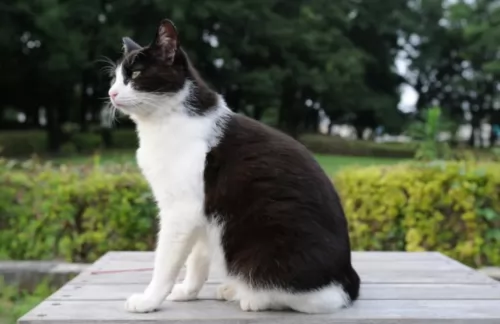 The first thing to know is that a Bicolor cat isn’t in fact a breed. Bicolor is just a term that describes a certain look that a cat has with its coat. It’s a cat with two colors such as red and white or black and white.
The first thing to know is that a Bicolor cat isn’t in fact a breed. Bicolor is just a term that describes a certain look that a cat has with its coat. It’s a cat with two colors such as red and white or black and white.
A popular name for bi-color cats is also Piebald or Tuxedo, and in fact many cat breeds can produce bicolor kittens, or black and white kittens such as Cornish Rex, Maine Coon, Manx, and others.
There are different coat color combinations when it comes to bicolor cats and the black and white markings may be more common but there are other color combinations too such as orange and white.
Nobody seems to know the origins of the Bicolor cats so we are going to assume they come from the USA.
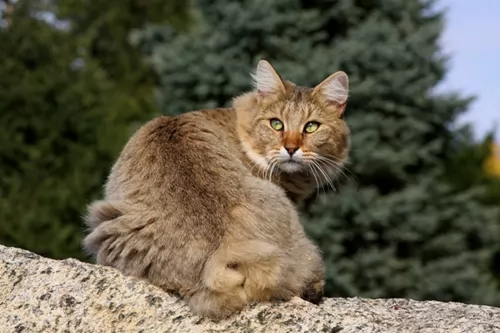 What is notable about this cat is that it can have a Bobcat like tail or it can have a full-length tail. They’re a fairly new breed and have been bred since the early 1990s. The whole purpose of breeding the cat was to develop a jungle cat hybrid with a spotted pattern.
What is notable about this cat is that it can have a Bobcat like tail or it can have a full-length tail. They’re a fairly new breed and have been bred since the early 1990s. The whole purpose of breeding the cat was to develop a jungle cat hybrid with a spotted pattern.
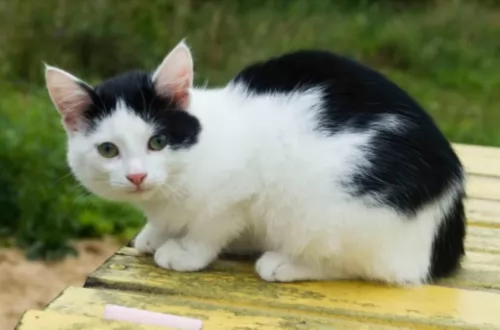 Regardless of the breed they belong to, information on these cats suggests that they can have many different looks. Look at the amazing Turkish Van cat for instance – each of these cats is recognizable for its long, luxurious fur. You’ll find a few touches of color on the cat's ears and tail, making in a Bicolor. They also have an interesting characteristic – being fond of water!
Regardless of the breed they belong to, information on these cats suggests that they can have many different looks. Look at the amazing Turkish Van cat for instance – each of these cats is recognizable for its long, luxurious fur. You’ll find a few touches of color on the cat's ears and tail, making in a Bicolor. They also have an interesting characteristic – being fond of water!
These Bicolor cats weigh in the region of 3 – 7kg, and can tend towards the smaller or larger size. Some of them can have short or long hair, larger or smaller ears and green or yellow eyes.
Coming from different cat breeds, the bicolor cat can have a mix of wonderful characteristics – they can be vocal or quiet or confident or shy.
They’re always wonderful though and can be curious, intelligent, playful, loving and loyal. They make great companions who just love the interaction they have with their human owners.
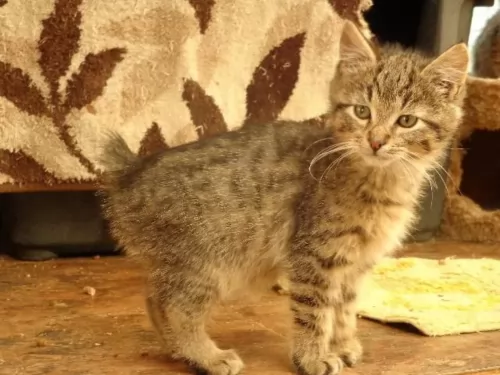 These are big cats and can weigh between 6 and 10kg. The leopard-spotted coat comes in all shades – brown, tawny, gold, silver and black with you not likely to see solid shades.
These are big cats and can weigh between 6 and 10kg. The leopard-spotted coat comes in all shades – brown, tawny, gold, silver and black with you not likely to see solid shades.
The coat can be short or medium-length. The cats have a thick muzzle and he has hooded eyes. The ears are fairly large and placed high o the head. They’re well muscled with long legs with the hind legs being fairly longer than the front legs
The Jungle-Bob loves his food. He loves interactive toys that hold the food and encourage him to think about how to get the food out.
He loves his human family and bonds strongly with them, loving to play rough and tumble games with the kids. He gets on well with children as well as other pets in the house.
You may find your Jungle-Bob being shy and not wanting to be friendly with strangers. They’re intelligent cats and have been known to learn how to open certain doors and cupboards. They can also be taught to walk on a leash.
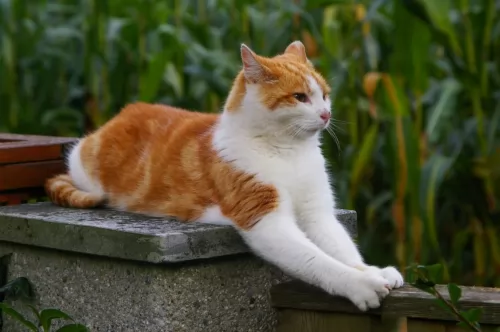 The Bicolor cat is such a steady, reliable cat-friend to have. When you start looking as these cats as your companion, you're going to get a smart, funny, adoring, playful family member who will be there for you whether you go to work each day or stay at home.
The Bicolor cat is such a steady, reliable cat-friend to have. When you start looking as these cats as your companion, you're going to get a smart, funny, adoring, playful family member who will be there for you whether you go to work each day or stay at home.
They’re such easygoing cats, with no airs and graces. They’re happy, relaxed, and uncomplicated cats and when you make a Bicolor your pet and friend, your life just becomes that much more meaningful.
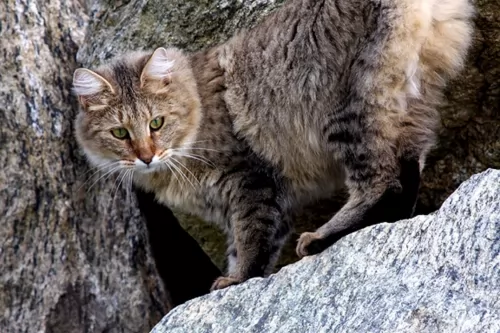 Your Jungle-Bob, just like all cats with a wild side, should have a largish outdoor cage. Keeping a hybrid cat like the Jungle-Bob is far more challenging than keeping a regular domesticated cat.
Your Jungle-Bob, just like all cats with a wild side, should have a largish outdoor cage. Keeping a hybrid cat like the Jungle-Bob is far more challenging than keeping a regular domesticated cat.
Hybrid cats like these are always active and they require lots of exercise. They can learn to walk on a leash.
Hybrid cats like this are made up of many species and they come with lots of interesting fur patterns. but that shouldn't be your motivation for buying one.
Think carefully before you own one of these cats as they’re beautiful for sure, but sometimes they become too much for the owners and then they land up in shelters. Be informed before you invest in one of these cats.
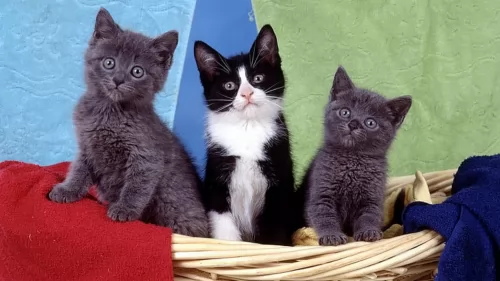 By providing your kitty cat with a loving home, you can ensure that he stays as healthy as possible. Unfortunately though, cats can get sick, regardless of how well you take care of them and then as a responsible pet owner, you will be able to take your pet to your local vet.
By providing your kitty cat with a loving home, you can ensure that he stays as healthy as possible. Unfortunately though, cats can get sick, regardless of how well you take care of them and then as a responsible pet owner, you will be able to take your pet to your local vet.
Some of the common cat problems you get can be kidney disease, ear infections, dental disease, parasites such as heartworm, cancer or something like feline immunodeficiency virus.
Whether your cat has a virus or an infection, remember that getting your cat to the vet can mean nipping the problem in the bud before it gets more serious.
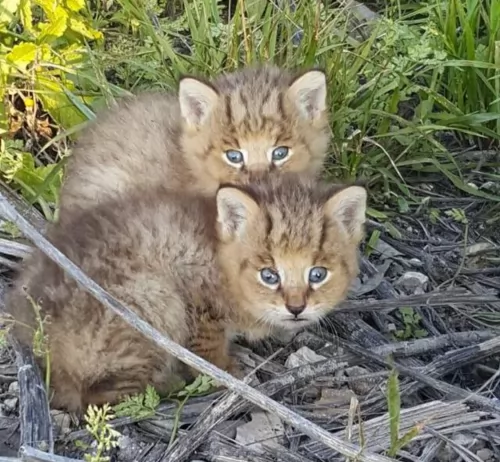 Even a trip to the vet can be a challenge and it can be a frightening experience for a hybrid cat. They may even need to be sedated before the vet can examine them.
Even a trip to the vet can be a challenge and it can be a frightening experience for a hybrid cat. They may even need to be sedated before the vet can examine them.
Also, did you know that in terms of rabies, which can be a fatal disease, it is not positive that these vaccines even work with a hybrid cat? So if your pet is exposed to rabies, it could spell great danger for you and your hybrid pet.
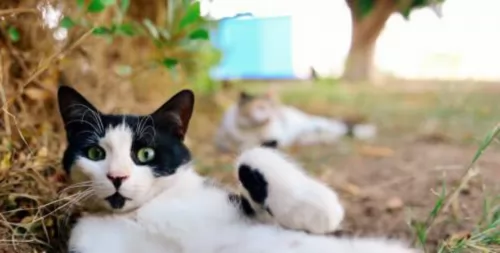 Caring for your Bicolor cat is much the same as with any other cat. Your Bicolor will shed, so brushing him will tickle him pink, especially if you do it lovingly and gently – it’s like a bonding session. The weekly brushing will get rid of loose hairs and dust and keep the coat healthy and shiny.
Caring for your Bicolor cat is much the same as with any other cat. Your Bicolor will shed, so brushing him will tickle him pink, especially if you do it lovingly and gently – it’s like a bonding session. The weekly brushing will get rid of loose hairs and dust and keep the coat healthy and shiny.
Spay or neuter your pet to avoid unwanted kittens. Stay up to date on veterinary visits and vaccinations.
Provide your cat with stimulating toys as well as all the equipment he needs to be comfortable – food and water bowls, litter box, grooming equipment, bedding, climbing- and scratching equipment.
All cat owners, whether their cats eat homemade food or wet- or dry food should read cat food labels and understand the nutrients content.
Certainly, as a carnivore, cats require certain vitamins, minerals, and proteins that only meat can provide.
Understand how to work out if the cat food is balanced or not and not packed with too many grains and carbohydrates.
How much your Bicolor eats will depend on his age and his activity levels. Be careful not to overfeed your cat as overfeeding is dangerous. When cats put on too much weight, it leads to problems such as diabetes, heart- and joint disease.
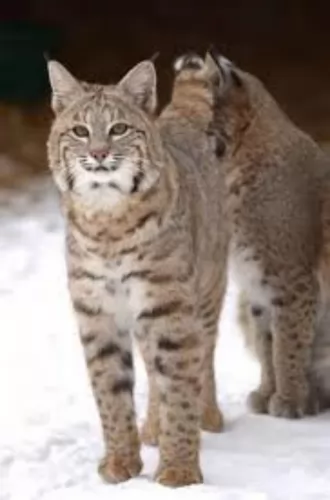 Before you invest in one of these hybrid exotic cats do research because they’re different from your regular domestic cats.
Before you invest in one of these hybrid exotic cats do research because they’re different from your regular domestic cats.
Because they have a wild side, they’re not suited to small apartments. Apart from being both an indoor and outdoor cat, he will require a fairly large outdoor cage with one part dedicated to shade and shelter for him.
Even though you will buy your Jungle Bob a litter box for indoors, remember that even though you train your cat to use it, the wild part of the cat means that he will spray and do his business on your carpets or against your furniture as well.
This is precisely why so many cat shelters are full of these cats. They become a handful for their owners, and their owners just hand them in as a bad experience.
A hybrid cat like the Jungle-Bob has a digestive system not quite the same as your regular domestic cat. It is absolutely imperative that these cats receive a meat diet as they are carnivores.
Keeping such a cat as a pet means you will need to invest in high-quality protein foods that sit well with this cat’s digestive system. A good guide for the Jungle Bob-cat is to steer clear of carbohydrates and feed your cat a protein-rich diet.
It is also a wise move to feed your new kitten the food that he has been eating at the breeder and then to make a gradual change to the best food protein there is.
Speak to your vet if in any kind of doubt. There are excellent high protein, high-quality commercial cat foods available on the market that make feeding a cat convenient as well.